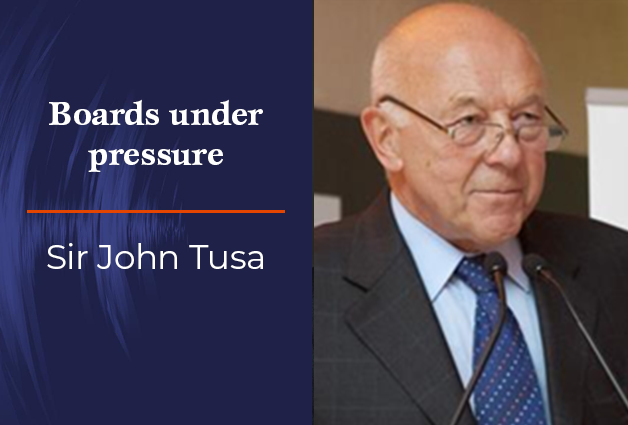Boards under pressure

There is little doubt that boards are under unprecedented pressure.
There is little doubt that boards are under unprecedented pressure. They face a multitude of widely differing demands and, in many cases, challenges. These situations and events are entirely new and have never been faced before. Increasing demands from different stakeholder groups, tougher legislation, a challenging economic environment and geopolitical challenges all exert pressures on boards, and not just one at a time. Coming to grips with several of these issues at the same time has become a high-stake juggling act, and now more than ever, boards need to perform.
In this podcast, Dr Sabine Dembkowski, Founder and Managing Partner of Better Boards, discusses board performance under pressure with Sir John Tusa, who has served on the boards of some of the most iconic cultural institutions in the UK. Sir John was the presenter of BBC’s Newsnight and the Managing Director of the BBC World Service. He was also the Managing Director of the Barbican Arts Centre and served on the boards of Cultural Institutions such as the British Museum.
Some of the key takeaways of the conversation include:
“Being on a board is not a party picnic”
Sir John explains that when under severe pressure, boards need to take stock and understand that being on a board is almost as difficult, (if not more difficult) as actually running an organisation. Many board members join boards thinking it will be interesting, enjoyable, and relatively straightforward. The reality is both complicated and demanding. He notes that it is also important to remember that board members do not run the organisation, they are not the management, and they don’t have to make the decisions. However, relationships are key – between the Chair and the chief executive, the board, and the management team. These relationships must be very close but maintain awareness that the management team is there to make the decisions, and the board is there to review them. Sir John also cautions that being on a board is not about observing the rules of a board, but about behaviour between board members. He believes that if the atmosphere on the board, between board and management, and between Chair and Chief Executive Officer are right, this gives the best chance of overcoming problems.
“You do learn by experience, and you do learn over time by observing bad decisions being taken”
Sir John explains that, to a degree, you learn by experience over time. Some of this learning is gained by observing bad decisions being taken (sometimes by yourself), which is not comfortable. There may be no perfect answers, but learning from past experience is key, so the experience of going through decisions (including bad ones) and learning from them is critical.
“It’s not about seeing how many times your name appears on the minutes of the meeting.”
Sir John believes that the Chair is responsible for the relations and atmosphere between board members. A good Chair will take a particular member aside after a meeting and have a quiet word when necessary because managing board behaviour is extremely important. Also, not everyone has to say something about every subject on the agenda. One contribution in just one meeting may be a decisive contribution, and Sir John gives an example of a major decision taken by one person who spoke for around two minutes and shaped policy for 20 years. He explains that just because an expert is on the board, they are not the only people who can speak about their field of expertise. Everybody has the right and responsibility to have an opinion on anything because everybody on a board is a generalist. Possibly a generalist with an available expert background, but members are all individuals with equal responsibility.
Sir John notes that although the CEO and CIO decide the order of the agenda, if any member thinks an issue is not high enough up the agenda, then they should question this. Sometimes the question has to be asked, especially if there is any sense that management is not facing up to the scale of a problem they face.
“Always face the reality of the situation”
Sir John advocates being realistic because however unpleasant and difficult, organisations which face up to problems and deal with them always come out of financial/economic crises faster, better, more efficiently, and more successfully. The reward of facing the facts is that they are much better placed to deal with the upswing later. The price for not facing facts is that things get steadily worse, usually because the board and management cannot quite grasp the scale and nature of the problem and do not act quickly. Delay always costs money, and Sir John believes boards have a very important role in warning management not to put off facing up to a problem. Realism, determination and calm are all essential and must come from the top and individual members.
The three top takeaways from our conversation are:
- Don’t expect things to be terribly nice! This is tough, but in the end, it is the satisfaction of performing your responsibility. Every time you turn up, your chances of finding real satisfaction are much greater.
- You will be sitting with colleagues who have considerable skills. Use, acknowledge and respect those skills. This will create teamwork, and they will respect your skills as well, and start acting together as a team.
- Even in the worst case, there is always something to be learned. You may be involved in closing an organisation down, but even this can be done well or badly, and there will be something that will be learned to use later.
Don’t forget to subscribe never to miss an episode of the Better Boards Podcast Series. Available on Apple, Spotify or Google.
To find out how you can participate in the Better Boards Podcast Series or more information on Better Boards’ solutions, please email us at info@better-boards.com.



